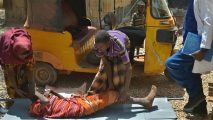Privacy Overview
This website uses cookies so that we can provide you with the best user experience possible. Cookie information is stored in your browser and performs functions such as recognising you when you return to our website and helping our team to understand which sections of the website you find most interesting and useful.


















17, May 2019
Southern Cameroons refugees flee clashes and find safety in Nigeria 0
When armed men swept into her village in North-West Cameroon, mother-of-four Loveline only had time to gather up her children and run.
“I could not take any clothes. There was shooting – they killed my uncle and shot my cousin,” says the 39-year-old.
As she fled into the bush, gunmen shot dead her husband. Out of the corner of her eye, she saw the armed men douse their house in petrol and set it alight.
In another village, Myriam, 22, looked on as gun toting men stormed into her community and opened fire.
“You could see the bullets passing in front of you,” says Myriam, who escaped into the bush with her family. Returning to the house to try and retrieve their belongings, they were met with gunfire.
“Staying in the bush with the kids is not easy,” Myriam says. “There are mosquitos, there is hunger.”
Loveline and Myriam are among some 26,000 civilians who have fled the southwest and northwest regions of Cameroon and sought safety in Nigeria’s south-eastern Akwa Ibom, Cross River, Benue and Taraba states. Women and children account for four-fifths of the population.
Anglophone residents of the country’s restive provinces have long had greivances against the largely Francophone central government. They say the country’s French-dominated legal and educational systems have left them on the margins.
This crisis erupted some three year after protests turned violent, with some calling for secession. So far this year, some 400 civilians have been killed in escalating attacks between separatatist groups and government forces, according to rights groups.
In March, UNHCR, the UN Refugee Agency, warned that the plight of the refugees in Nigeria was becoming increasingly desperate. While the government has given land for refugee settlements, it is now fully occupied and more will be developed. At the same time, the provision of shelter, food, water and sanitation by UNHCR and its partners has been constrained by severe underfunding.
“The government recently provided us with other settlements but we need more resources in order to establish the settlements and receive further refugees,” says the head of UNHCR’s field office in Ikom, Mohammad Rafiq Nasry.
As the response struggles, many refugees have found support within host communities. The inhabitants of small border villages share what they have with them – food, a room to sleep or work in the cocoa plantations. Some received a piece of land to cultivate. However, solidarity alone is not enough for people who have lost everything to re-start their lives.
“To make a better living, I will have to move,” says refugee Elias Enu, a nurse turned farmer, who struggles to feed his family of 10.
Meanwhile Myriam and Loveline, who reached Nigeria empty-handed and scared after weeks in the bush, were initially given a place to stay by a local resident in Ajassor, along with their children and relatives. Together, they took turns to work and care for the children, shared food and patiently endured sleepless nights due to a lack of space.
Then, last month, the women boarded a bus to reach the Adagom refugee settlement in Nigeria’s Cross River State. They could barely hide their excitement, laughing and smiling.
“I want my children to go to school,” said Loveline, from the front seat. “I would like to receive support to start a business to allow my children to go to school.”
Myriam, too, is looking forward to a happier future. Although one day she hopes to return home to Cameroon, she knows she is stronger with Loveline by her side.
“I am happy to be here. That is why when we were told to relocated we did not hesitate to pack. Because we know the burden we have been carrying. It will be lighter here.”
Their hopes for a stable future depend in large measure on funding.
Source: United Nations High Commission For Refugees